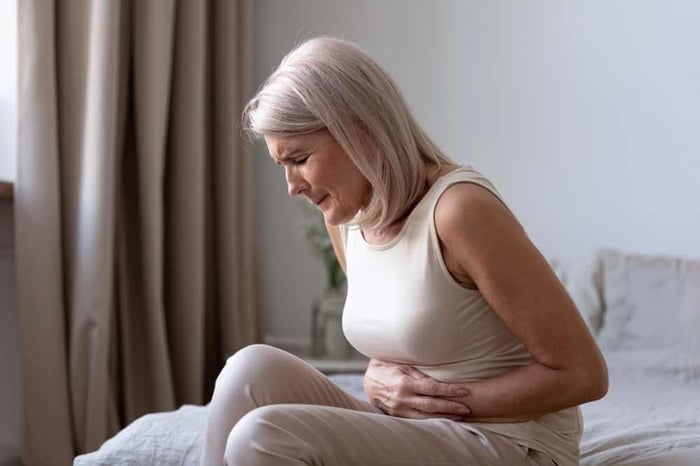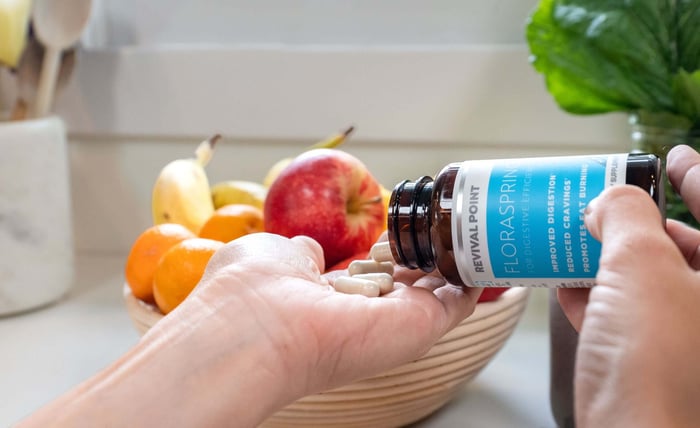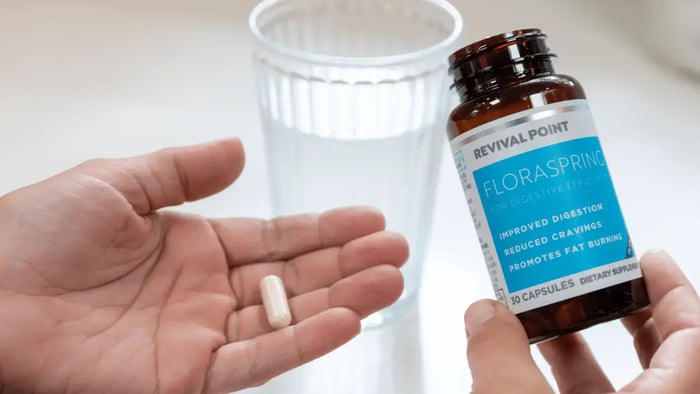Most people don't want to talk about their digestive system issues. But as more research comes out s between our gut health and our overall health (1) it becomes more and more important to pay attention to our stomachs.
Sometimes your stomach will warn you of a wider-reaching issue. Some of these issues might be serious. Or they might be as simple as an undiagnosed food allergy.
The trick is learning to tell the difference.
From frequent bathroom trips to hard stomachs this article will cover the most common digestive symptoms that you don't want to ignore.
1) Constant Bathroom Trips
An unfortunate after-effect of eating is, eventually a trip to the restroom. But these trips should be hours later, if not the next day. And they shouldn't be unpleasant or drawn-out.
Put a little less delicately, there is something wrong if you end up in the bathroom an hour or so after every meal. And there is definitely something wrong if you experience frequent diarrhea.
This sort of thing is embarrassing to talk about. So are the frequent runs to the bathroom and the old habits of making sure you're home not long after you eat.
The good news is that there is probably a very easy fix. Most of the time when this happens to someone it is because they have an undiagnosed food allergy.
f it doesn't seem triggered by one specific food, you may have IBS. This is harder to deal with but is generally not life threatening.
The only way to be certain is to track your food intake and compare it to when your stomach gets upset. Take your findings to a doctor and work together to find a solution!
2) Black Stool Or Black Flecks
When talking about digestive issues, it is very hard to be delicate. So when I say that poo comes in many colors, please take with as much poise as possible.
And while I'm sure this isn't fun to learn it is important information if you're worried about your gut health.
While healthy poo comes in many colors, black is not one of them. Certain supplements like iron will cause your stool to darken. But if you're not taking iron supplements then you'll want to talk to a doctor soon.
Black stool whether it is completely black or flecked with something that looks like ground coffee means there's blood mixed in. The coffee-like flecks are dried blood while a more uniform color can mean a higher presence of blood being mixed in more recently.
Of course, blood in the stool isn't always black. Things like hemorrhoids and small tears in the anal tissue can cause the appearance of red blood.
Whether red or black, however, bloody stool is bad news. It has causes that range from inconvenient to very serious so be sure and talk to a doctor soon.
3) Odd Pains
Sometimes the issue you're facing isn't what comes out after you eat. Its what you're feeling in your stomach and the area around it.
These issues are most likely gas. But when there not gastheyre either too severe or they last too longt hey might be something that requires a little more attention.
Pulsing Pain
Our stomachs do strange things. But if your stomach begins to pulse with sharp bursts of pain that don't clear or cause gas you might want to see someone, and soon.
And by soon, I mean you might need to go to the ER.
Sudden, intense pulses of pain could be an aneurysm in your gut. And while these might be less serious than a brain aneurysm, its still bad news. Aneurysms in your stomach might burst which can lead to major internal bleeding.
They are, thankfully, relatively rare. Such aneurysms are more common after 65 though. So pay attention to pain in your gut!
Another kind of pain you need to watch out for is a sudden pain high in your stomach. This could be a sign of gallstones.
Gallstones need to be treated by a medical professional. There are several treatment options if you suffer from gallstones but a doctor is the only one who can decide the best treatment option for your specific situation.
Pain Low On The Right Side
Pain that starts on the lower right side of your stomach and sticks around might not be your stomach at all. This is one of the first symptoms of appendicitis.
Now, appendicitis might be common in popular media but not everyone will develop it in their lifetime.
If you are one of the unlucky sufferers, however, you will end up heading to the ER. The appendix will have to come out after which you should be fine.
4) Swelling & Hardness
If youve ever eaten too much, you know the feeling of being overly full. If that feeling persists hours after a meal if its constant. or if your stomach is hard to the touch, then you might have a bigger issue on your hands.
A swollen, hard stomach means that you're not digesting and passing the food that you eat. You might just need more fiber.
But if Metamucil and a side salad aren't cutting it then you need to get a doctor involved. Sometimes these issues can be so bad that they affect the smell of your breath, your sleep, and your appetite.
The causes range from an infection to food allergies to more serious issues like growths and cancer. Its not something you want to try and clear up over a long period of time.
A doctor can help you figure out the cause and get you started on a treatment.
The Takeaway
You might not want to talk to many people about your tummy troubles but you dont want to ignore them either.
Whether you have an allergy you didnt know about or youre dealing with something more serious the best solution is to face it head on.
If you experience any of these issues, particularly one that tends to come and go or lasts for some time a journal can help. You can track your symptoms and then take it to a doctor which will help remove a lot of guesswork.
This is especially true if you also track when and what you eat.
With this information, a doctor can either rule out or confirm an allergy. Once that has been determined you can work together to find out whats causing your issues and the best way to solve them.
Easy & Effective Tips For Easing Digestive Issues
If you're looking for an easy way to improve your digestive health here are a few ways to help.
Add Microbes
Including gut-friendly bacteria in your diet can aid in the breakdown of food and promote healthy digestion. Individuals who have a history of antibiotic use and poor eating habits may not have enough beneficial bacteria in their system, which can contribute to digestive issues.
One effective way to increase your intake of beneficial bacteria is to take probiotics, such as Floraspring. This supplement contains synergistic microbes that work together to provide a broader range of microbial diversity, which can help fortify your gut with healthy bacteria.
It's important to note that it's a good practice to periodically cycle on and off probiotics to prevent your body from becoming too reliant on them. By incorporating Floraspring probiotics into your routine and cycling them as needed, you can support the growth of healthy gut bacteria and promote optimal digestive health.
Improve Bile
Bile is an important digestive fluid that plays a crucial role in the breakdown of dietary fats. Produced by the liver and stored in the gallbladder, bile acts as a detergent that dissolves fats and facilitates their absorption in the small intestine.
However, individuals who have had their gallbladder removed or those with a sluggish gallbladder, as well as those experiencing high levels of stress or estrogen during pregnancy, may experience a deficiency in bile. This can lead to a range of uncomfortable symptoms such as constipation, headaches, and right shoulder pain.
Fortunately, adding bile to your diet can help alleviate these digestive issues. By acting as a lubricant and aiding in the digestion of fats, bile can help improve overall digestive health. Additionally, taking digestive enzymes such as Florazymes can provide an additional boost to support healthy digestion.
Ensuring adequate bile production and supplementing with digestive enzymes can play a significant role in maintaining optimal digestive health.
Add More Vegetable Fiber
There is a widely held misconception that taking fiber or Meta Mucil is a magic bullet for promoting regular bowel movements. However, the role of fiber in the digestive system is often misunderstood. In reality, fiber serves as a source of nutrition for the beneficial microbes in our gut, which in turn help to maintain optimal digestive health.
It's worth noting that not all fiber is created equal. While vegetable fibers provide valuable nutrients, fiber derived from grain-based supplements may not be the best option. Instead, incorporating fiber-rich vegetables into your diet can be a more effective way to support healthy digestion and prevent constipation. Thankfully, there are many vegetables that are high in fiber and easy to incorporate into your meals.
- Brussels sprouts: These small, green vegetables are packed with fiber, with about 4 grams of fiber per cup.
- Carrots: Carrots are a good source of fiber, with about 3.5 grams of fiber per cup.
- Sweet potatoes: Sweet potatoes are a great source of fiber, with about 4 grams of fiber per cup.
- Spinach: Spinach is a leafy green vegetable that is high in fiber, with about 4 grams of fiber per cup.
- Kale: Kale is a nutrient-dense leafy green vegetable that is high in fiber, with about 3 grams of fiber per cup.
- Artichokes: Artichokes are a vegetable that is high in fiber, with about 6 grams of fiber per medium-sized artichoke.
- Peas: Peas are a good source of fiber, with about 9 grams of fiber per cup.
- Avocado: Avocado is a high fiber fruit, with about 10 grams of fiber per cup.
- Beets: Beets are a root vegetable that is high in fiber, with about 3.5 grams of fiber per cup.
Including these vegetables in your diet can help you meet your daily fiber requirements and promote good digestive health.
References:
(1) Hills, R. D., Pontefract, B. A., Mishcon, H. R., Black, C. A., Sutton, S. C., & Theberge, C. R. (2019). Gut microbiome: profound implications for diet and disease. Nutrients, 11(7), 1613. doi: 10.3390/nu11071613.
This article provides a comprehensive overview of the gut microbiome and its impact on overall health, including the role of gut bacteria in digestion, immune function, and disease prevention. The authors discuss the importance of maintaining a healthy balance of gut bacteria through diet and lifestyle interventions, and provide practical recommendations for promoting optimal gut health.



